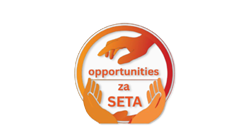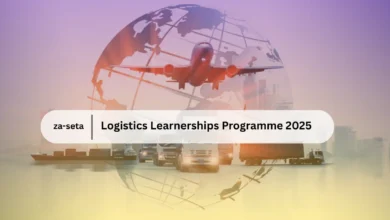E-Learning Learnerships Programme 2025 | Gain Skills & Earn While You Learn

Thinking About E-Learning Learnerships? Read This First
Apply for the E-Learning Learnerships Programme 2025 and boost your career with accredited online training.
What Are E‑Learning Learnerships?
- Define the format: a hybrid of online theoretical learning + structured practical placements (webinar, assignments, mentorship).
- Accreditation details: NQF-aligned, SETA certification, recognized by employers.
- Delivery method: 100% online, accessible on any device, self‑paced with support.
3. Why Choose an E‑Learning Learnership?
- Flexibility & Accessibility – study anywhere anytime, ideal for those with work/family commitments or distant from campuses .
- Cost‑effectiveness – no commuting or accommodation costs.
- Employment Edge – practical workplace projects plus industry‑recognized certification.
- Wide Field Choices – finance, IT, healthcare, marketing, skills development, etc.
- Career Outcomes – upskill, reskill, and increase job market competitiveness.
4. Core Features & Components
Break down typical programme structure:
- Modular Online Learning – videos, quizzes, downloadable workbooks.
- Practical Projects/Workplace Exposure – virtual or in‑person placements.
- Mentorship & Webinars – guided by industry experts.
- Assessments & Certification – tests, portfolio reviews, final exam, NQF‑aligned certificate.
- Support & Community – peer groups, discussion forums, WhatsApp channels.
- Digital Badges & Lifelong Access – some include micro‑credentials and post‑certification alumni benefits.
5. Who Can Apply?
- Eligibility: SA citizens aged 18–35 (some programs offer wider age range) .
- Educational requirements: Matric or Grade 10–12; certain NQF level entry criteria.
- Experience: none needed for entry‑level; intermediate tracks welcome those with some background.
- Technical prerequisites: internet access, computer or smartphone, basic digital literacy.
6. How to Apply
- Step 1: Research providers (SETA, private colleges like Milpark, Oxbridge, Regenesys, Eduvos).
- Step 2: Prepare documents – ID, CV, academic records, motivation statement.
- Step 3: Complete online application form on specific provider site.
- Step 4: Await screening, interviews, digital assessment.
- Step 5: Upon acceptance – orientation, access to platform, enrolment confirmation.
- APPLICATION PROCESS
- Tips: Tailor your CV/motivation, apply early, prepare for basic assessments.
7. Sample Programmes & Providers
Write mini‑profiles:
Milpark Education Online Learnerships
- NQF levels 5–7; fully online via video & live sessions.
Oxbridge Academy Distance Learnerships
- Focus on business, IT, and finance; strong support via digital forums .
Regenesys Learnership Tracks
- Accredited via CHE & DHET; corporate and skills‑focused options .
Eduvos Online NQF‑aligned Courses
- Multiple faculties; online platform with VR/AI support .
SETA‑Accredited Options
- Examples include Tusanang, Skills Junction, Smart LMS, Umuzi IT, Red & Yellow marketing.
For each: mention target learners, cost range (if available), duration, outcomes, links to apply.
9. Fees & Funding
- Many SETA programs are free or heavily subsidised via levy grants.
- Private institutions offer payment plans and early‑bird discounts.
- Provide guidance: check bursary options, employer‑sponsored training, National Student Financial Aid (NSFAS) eligibility.
- Encourage learners to confirm costs upfront.
10. FAQs
Address common questions such as:
- How long is a learnership?
- Certification and recognition? (employers & SAQA)
- Technical requirements?
- Completion rates and support?
- Full vs part‑time commitment?
- Post‑learnership support?
Benefits of the E-Learning Learnerships Programme 2025
The E-Learning Learnerships Programme 2025 offers a wide range of advantages to learners, employers, and the broader economy. Whether you’re just starting out or looking to enhance your career, the benefits of enrolling in an accredited, flexible e-learning programme are extensive and long-lasting.
For Learners
1. Flexibility & Convenience
One of the most significant advantages of e-learning is that you can study from anywhere, at any time. This makes it ideal for those who may have jobs, family responsibilities, or live in remote areas without easy access to traditional training institutions.
2. Accredited Qualifications
All learnerships are aligned with the National Qualifications Framework (NQF) and accredited by Sector Education and Training Authorities (SETAs). This ensures that the skills you gain are recognized by employers across South Africa.
3. Practical Work Experience
In addition to online learning, you’ll gain hands-on experience through workplace assignments or internships. This real-world training bridges the gap between theory and practice—making you more employable.
4. Cost-Effective Learning
Most e-learning learnerships are either fully funded by SETAs or available at a lower cost than traditional college courses. You also save money on travel, accommodation, and study materials.
5. Increased Employability
By the end of the programme, you’ll have both a formal qualification and relevant work experience, significantly boosting your CV and job prospects. Many learners even receive job offers during or immediately after the programme.
6. Personal & Professional Growth
Apart from technical skills, you’ll develop essential soft skills like time management, communication, problem-solving, and self-discipline—qualities highly valued by employers.
7. Digital Literacy
Since the programme is delivered online, you’ll also improve your computer and digital skills, making you more adaptable in today’s technology-driven job market.
For Employers
1. Workforce Development
Learnerships help businesses develop skilled and knowledgeable employees who can contribute effectively to operations and innovation.
2. B-BBEE Compliance
Participating in accredited learnerships can improve a company’s Broad-Based Black Economic Empowerment (B-BBEE) score, particularly in the Skills Development pillar.
3. SETA Grant Benefits
Employers can apply for SETA discretionary and mandatory grants to fund the training, making it a financially smart investment.
4. Reduced Turnover
Learners trained within a company environment tend to be more loyal, reducing staff turnover and recruitment costs.
5. Customized Talent Pipeline
Learnerships allow employers to shape and mentor talent specific to their industry needs, reducing the skills mismatch commonly seen in hiring.
For South Africa’s Economy
1. Skills Development
These programmes address critical skills shortages in sectors such as IT, finance, healthcare, and entrepreneurship—supporting national development goals.
2. Youth Empowerment & Employment
Learnerships provide young people with opportunities to break into the job market, reducing unemployment and poverty.
3. Inclusive Growth
By making quality education accessible to people in under-resourced areas, e-learning promotes economic inclusivity and equity.
Summary of Key Benefits
| Benefit Category | Highlights |
|---|---|
| Learners | Accredited training, workplace exposure, career readiness |
| Employers | Skilled talent, grant access, B-BBEE score improvement |
| National Impact | Economic growth, reduced youth unemployment, digital advancement |
The E-Learning Learnerships Programme 2025 is more than just a course—it’s a gateway to opportunity, self-improvement, and economic empowerment. Whether you’re a job-seeker, student, or employer, this programme offers lasting value at every level.


